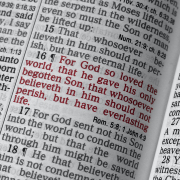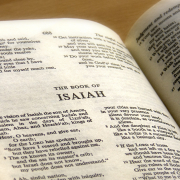What is Atonement?
Atonement is not a particularly popular word in English, but perhaps you are familiar with Yom Kippur, which means Day of Atonement. It is a time when many Jewish people fast and pray, seeking God’s forgiveness. In everyday speech, the verb atone is more common and means “to make amends, to provide compensation for wrongdoing.”1 In other words, atonement leads to revived unity between a hurt party and the offender. This word emphasizes that the ultimate goal of atonement is relational, restoring our relationship with someone we have hurt.
That is exactly what happens when we accept God’s forgiveness. He made us to love and live in harmony with him, each other, and the earth. He fashioned us “in his own image” to reflect his loving character in the world (Genesis 1:26–27). Our current existence, however, falls markedly short of that original purpose. We often struggle to have the relationships we long for—whether it’s with our parents, spouse, children, friends, siblings, or colleagues. Instead of love and mutual flourishing, such relationships are marred with baggage and pain. Even in relatively healthy families, rash words or misunderstanding can strain emotional connections for years. Instead of harmony, we are alienated from God, other people, and even ourselves.
Atonement, or making amends, among people might include apologizing and, in some cases, providing financial restitution. However, we cannot repay every unkind word or action we have ever done. Sometimes we are not even aware that we have hurt another person! Even if we did manage to secure forgiveness from everyone we have ever wronged, we would still be in a broken relationship with God.
God’s forgiveness requires sacrifice. This may seem drastic, but God, the king of the universe, is holy and perfect, meaning that a deed against him is even worse than one against a fellow human. Indeed, even if we try to live an honest, upright life, we have all rebelled against God somehow, wanting to go our own way instead of doing what he expects of us. Nevertheless, God has provided a way to receive forgiveness. Jesus, the hope of Israel and the nations, lived a perfect life and died to pay the penalty of our wrongdoing, securing atonement for all who trust in him (Isaiah 53:5–6). He then rose to life and will return to restore all the world to God’s original design.
God promises that those who turn from their sin and believe in the atonement he has provided will most assuredly be forgiven (Isaiah 1:18). Not only that, but the relationship we were meant to have with our loving God is restored when we receive his atonement. As we grow in knowing God, we are also empowered to better love those around us. This does not mean that our personal relations become perfect and free of misunderstanding, but it does mean that where there was alienation, there is hope for restoration. In Yeshua, we can experience healing in our relationships with God, others, and even in our broken concept of self, which left to its own devices can easily fall into self-centeredness or self-hatred.
Understandably, this is a lot to take in, especially if you are asking questions about Jesus for the first time. We encourage you to continue asking those questions and exploring the topics on this site, which go into more detail about who Yeshua is and how he transforms lives.









